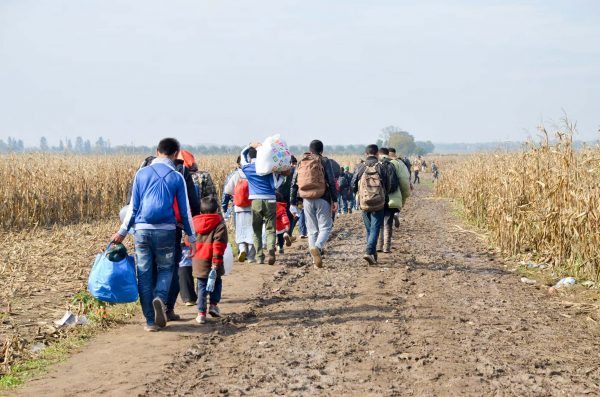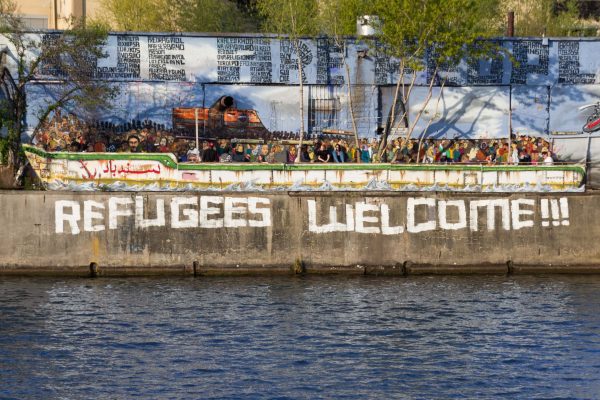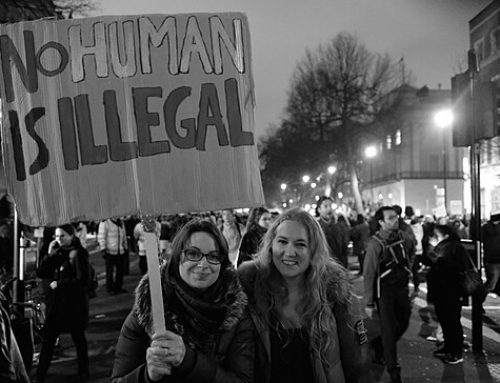This is the second in a series of blogs on the issue of habitual residence written by students from Binghamton University, whom the hub hosted in Summer 2024.
It was written by Amelia Thorp.

Is it morally and legally correct that people forced to flee to another country for safety must meet a wider habitual residence test?
Habitual residency is a crucial concept in international law, particularly in contexts such as child abduction, nationality, custody, and asylum cases. Different international statutes and treaties define habitual residency in various ways, influencing how these cases are handled. This blog examines how habitual residency is determined under several key international instruments, compares these definitions to those applied in family reunion cases for overseas asylum-seeking families, and explores the moral implications of these definitions. Additionally, it critically analyzes Appendix Family Reunion (Protection) of the UK Immigration Rules to define and understand habitual residency within the context of family reunion cases.
International Definitions of Habitual Residency
The Hague Convention on the Civil Aspects of International Child Abduction (1980)
The Hague Convention does not provide a precise definition of habitual residency. Instead, it relies on judicial interpretation, focusing on the child’s degree of integration into a social and family environment. Courts typically consider factors such as the duration, regularity, conditions, and reasons for the child’s stay in a particular place.
The Hague Convention’s approach aims to prioritize the child’s stability and well-being by maintaining their connections to familiar social and family environments. If the UK adopted the Hague Convention’s definition, then overseas applicants for family reunions in the UK could benefit significantly. Such a definition would recognize the importance of familial support networks in promoting emotional stability and psychological well-being. By prioritizing these factors, the immigration process could facilitate quicker and smoother reunifications, reducing the stress and uncertainty experienced by families separated due to migration. Additionally, focusing on the applicant’s integration ensures decisions align with their best interests, supporting their adjustment and development within their new family and community context.
On the other hand, this interpretation could hinder applicants, as family reunion cases for asylum seekers would require demonstrating the applicant’s integration into the community where they currently reside overseas. This might involve showing the applicant’s involvement in local activities, schooling, or social networks. This could disadvantage those in refugee camps or transient situations where integration is challenging, impacting their ability to join their family in the UK. Further, it could work against applicants who may be unable to integrate into the society of their habitual residence due to disability, language barriers, or safety concerns.
The European Convention on Nationality
The European Convention on Nationality defines habitual residency as the place where a person lives with the intention of remaining there for a settled period, irrespective of temporary absences. It emphasizes the individual’s intention to stay as a key element.
This definition recognizes the individual’s autonomy and personal choice, reflecting a moral respect for their intentions and plans. For asylum-seeking families in the UK, establishing an intention to remain can be complex due to the uncertainty of their asylum status. Unlike the clear-cut intention to stay emphasized by the European Convention, the UK’s interpretation of asylum cases often takes into account the asylum seekers’ precarious situations and the forced nature of their displacement, which might not allow for clear evidence of intent to settle.
If the UK adopted the European Convention’s definition, applicants would need to prove their intention to stay in the country of their habitual residence, such as showing long-term plans or commitments to live there, including close family ties, employment prospects, or housing arrangements. Asylum seekers might struggle to provide such evidence due to their uncertain status, potentially making it harder for their family reunion applications to succeed. Additionally, families may not intend to reside long-term in their country of habitual residence but nonetheless do so because of an inability to relocate.
Council Regulation (EC) No 2201/2003 (Brussels IIa)
Council Regulation (EC) No 2201/2003, known as Brussels IIa, does not explicitly define habitual residency but implies it through the context of a child’s immediate and permanent integration into a social and family environment. It aims for swift and effective decisions to protect the child’s best interests.
The regulation aims to protect children by ensuring that decisions regarding their residency are made quickly and effectively, minimizing prolonged legal disputes. Applicants of family reunion cases would benefit from a definition of habitual residency that ensures quick and effective decision-making by reducing the stress and uncertainty associated with prolonged legal disputes. This would allow families to reunite faster, enhancing emotional well-being and financial stability.
This definition could be problematic if it prioritizes speed over thoroughness, potentially leading to hasty decisions that don’t fully consider the applicants’ unique circumstances. Applicants might face difficulties proving immediate and permanent integration, especially if they lack strong initial ties to the new community. The emphasis on quick resolution might also result in less thorough evaluations of the applicants’ situations, possibly leading to unfair denials. Furthermore, strict criteria for integration could disadvantage those from different cultural or socioeconomic backgrounds who may need more time to adjust.
United Nations Convention on the Rights of the Child (UNCRC)
The United Nations Convention on the Rights of the Child (UNCRC) does not explicitly define habitual residency but emphasizes the child’s best interests as the primary consideration. The concept is interpreted to ensure the child’s right to maintain personal relationships and continuity in care and upbringing.
The UNCRC underscores the moral duty to prioritize children’s rights and well-being in all legal and administrative decisions. This broad, child-centric approach ensures that their developmental needs and emotional stability are at the forefront of any consideration of habitual residency. If the UK fully embraced the UNCRC’s approach, habitual residency determinations would prioritize the applicant’s best interests above all else.
Defining habitual residency to emphasize how reuniting with family in the UK fulfills the applicant’s emotional, educational, and social needs would have significant benefits. This approach would involve assessing the applicant’s current living conditions and considering the potential advantages of relocation, all while prioritizing their best interests. Even if the family hasn’t fully integrated into UK society, focusing on familial stability aims to support asylum-seeking families, ensuring that decisions prioritize continuity and recognize the developmental importance of maintaining family relationships.
However, this emphasis on moral duty and emotional stability could result in subjective and inconsistent decision-making, as different officials might have varying interpretations of well-being and best interests. It might also slow down the process, as thorough assessments can be time-consuming, and could be perceived as favoring applicants over other immigration considerations, potentially causing tensions or perceptions of unfairness among other groups seeking residency.

Critical Analysis of Appendix Family Reunion (Protection)
Appendix Family Reun ion (Protection) of the UK Immigration Rules is designed to allow family members of refugees and those granted humanitarian protection to join them in the UK. It outlines the eligibility criteria, application process, and specific requirements for different categories of family members, such as partners, children, parents, and other relatives. While Appendix Family Reunion (Protection) aims to facilitate family reunification and provide humanitarian protection, its stringent requirements and complex processes often hinder its effectiveness, leading to challenges and potential injustices for applicants.
The eligibility criteria of Appendix Family Reunion (Protection) provide a clear framework for who qualifies as a family member, which helps maintain consistency and clarity. However, the criteria can be overly restrictive, excluding extended family members or those with less formal relationships. This can lead to family separation, particularly in cultures where extended family plays a crucial role.
The application process includes detailed guidelines and requirements, ensuring applicants know what is expected. Nevertheless, the complexity and bureaucracy of the process can be daunting for applicants, especially those who have experienced trauma or are not fluent in English. Legal and administrative hurdles can delay reunification significantly.
Detailed documentation requirements help prevent fraud and ensure the legitimacy of applications. Yet, gathering the necessary documents can be extremely difficult for refugees who may have fled their home countries without all their papers. The requirement for extensive evidence can be a significant barrier.
There is an established process for making decisions and appealing negative outcomes, which provides a mechanism for review and correction. However, the decision-making process can be slow, and the appeals process can be lengthy and stressful, prolonging family separation. Additionally, the discretion exercised by immigration officers can lead to inconsistent outcomes.
Evaluation
While Appendix Family Reunion (Protection) provides a structured pathway for family reunions, its effectiveness is undermined by restrictive criteria and procedural complexities. Many eligible applicants find the requirements and process too burdensome. The stringent financial and documentary requirements can undermine the humanitarian intent of family reunions, leaving vulnerable families separated. This can have severe psychological and social impacts on refugees and their families. The restrictive nature of the rules raises ethical concerns about fairness and justice. The balance between preventing abuse of the system and protecting human rights is delicate, and current rules may lean too heavily towards the former.
Interpretation
Appendix Family Reunion (Protection) reflects a tension between maintaining immigration control and providing humanitarian protection. While the intent to facilitate family reunions is evident, the practical implementation often falls short. The rules could be seen as prioritizing administrative and financial considerations over the urgent humanitarian need to reunite families.
Leveraging International Statutes and Treaties for Change in the Family Reunion Legal Field
By examining definitions from instruments such as The Hague Convention on Child Abduction and the European Convention on Nationality, policymakers and practitioners can tailor policies that prioritize stability, well-being, and the integration of applicants into social and family environments. This approach not only ensures adherence to international standards that protect familial bonds and children’s best interests but also streamlines decision-making processes, reducing delays and uncertainties for families seeking reunification. Furthermore, integrating these insights into Appendix Family Reunion (Protection) of the UK Immigration Rules could lead to more equitable and compassionate outcomes, addressing the diverse needs of asylum-seeking families while upholding legal and moral obligations.
Conclusion
In summary, while international definitions of habitual residency offer varying perspectives that can either aid or hinder family reunion applications, Appendix Family Reunion (Protection)’s stringent requirements often present significant challenges. It is morally and legally complex to require people who have fled to another country for safety to meet a wider habitual residence test. Understanding and potentially integrating more flexible and humane interpretations of habitual residency could significantly improve the outcomes for asylum-seeking families, ensuring that the processes align better with both legal and moral standards.







